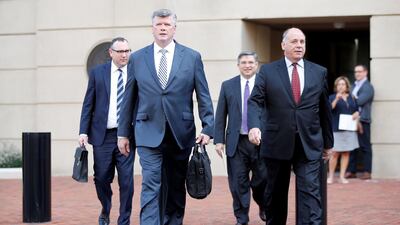A jury in Virginia completed its first day of deliberations on Thursday in the bank and tax fraud trial of Paul Manafort, president Donald Trump’s former campaign chairman, after asking the judge for the definition of “reasonable doubt”.
The six men and six women held around seven hours of discussions behind closed doors in the federal courthouse in Alexandria where Mr Manafort, 69, is being tried on 18 counts brought by special counsel Robert Mueller.
The case is the first to go to trial stemming from Mr Mueller’s investigation into Russia’s role in the 2016 US election, although the charges largely predate Mr Manafort’s five months working on the Trump campaign, including three as chairman.
Before wrapping up their work for the day, the jurors asked District Judge TS Ellis four questions, including clarification of the meaning of “reasonable doubt”. To convict Mr Manafort, the standard the jury must use is to find he is guilty beyond a reasonable doubt.
_______________
Read more:
Russia probe ‘unfairly’ ensnared Manafort, claims defence in closing arguments
Paul Manafort defence rests without calling any witnesses
_______________
“The government is not required to prove beyond all possible doubt,” Mr Ellis told lawyers in the courtroom before the jury entered, explaining how he intended to answer. Mr Ellis added that reasonable doubt was “doubt based on reason”.
The other questions delved into details of the case. One involved the government’s requirement for taxpayers filing a report regarding the existence of a foreign bank account.
Another centred on the definition of a ‘shelf company’, a term referring to a type of inactive company, and legal filing requirements for one. The last question involved how the list of exhibits was numbered.
Mr Trump has called Mr Mueller’s investigation a witch hunt and has complained about Mr Manafort’s treatment.
If convicted on all counts, Mr Manafort could face a sentence of up to 305 years in prison based on the maximum for each count, with the most serious charge carrying up to 30 years. However, if convicted, he likely would be given between seven and 12 years, according to a range of estimates from three sentencing experts interviewed by Reuters.
Mr Ellis began the jury instructions on Wednesday after the prosecution and defence delivered closing arguments, and finished on Thursday morning. “You can’t talk about the case unless all 12 of you are present,” Mr Ellis told the jurors, adding that they could take as long as they like to reach a verdict.
Prosecutors called 27 witnesses during about two weeks of testimony in the closely watched trial. The defence called no witnesses, arguing that prosecutors failed to prove their case.
The case involved millions of dollars Mr Manafort received from pro-Russian politicians in Ukraine for work as a political consultant. Prosecutors accused Mr Manafort of concealing more than $16 million in income from US tax authorities and fraudulently securing $20 million in bank loans.
Witnesses described how Mr Manafort routed $16 million in income hidden in foreign bank accounts to US vendors to purchase real estate, expensive clothing and antique rugs, income he is charged with omitting from his tax returns.
Mr Manafort, a veteran political consultant and prominent figure in Republican circles for decades, made his fortune helping to bring pro-Russian politician Viktor Yanukovych to power in Ukraine in 2010. When Mr Yanukovych fled Ukraine in 2014, the political work dried up and Mr Manafort lied about his finances to get loans from banks, prosecutors said.
The defence attacked the credibility of key prosecution witness Rick Gates, Mr Manafort’s long-time right-hand man who also worked for the Trump campaign and inauguration team. Mr Gates was indicted by Mr Mueller but pleaded guilty and is cooperating with prosecutors.
On Thursday, Mr Ellis invited others in the courtroom to remain while the jury deliberated and other cases were heard. He then called on a “Mr Trump,” prompting laughter and a smile from Mr Manafort. Jim Trump, a federal prosecutor involved in another case, responded.

